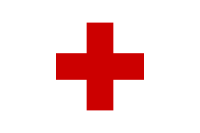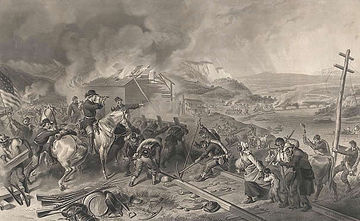1864
| Millennium: | 2nd millennium |
|---|---|
| Centuries: | 18th century – 19th century – 20th century |
| Decades: | 1830s 1840s 1850s – 1860s – 1870s 1880s 1890s |
| Years: | 1861 1862 1863 – 1864 – 1865 1866 1867 |
| 1864 in topic: |
| Subjects: Archaeology – Architecture – |
| Art – Literature (Poetry) – Music – Science |
| Sports – Rail Transport |
| Countries: Australia – Canada – China – France – Germany – Ireland – Mexico – Netherlands – New Zealand – Norway – South Africa – Spain – UK – USA |
| Leaders: State leaders – Colonial governors |
| Category: Establishments – Disestablishments |
| Births – Deaths – Works |
Year 1864 (MDCCCLXIV) was a leap year starting on Friday (link will display the full calendar) of the Gregorian Calendar (or a leap year starting on Wednesday of the 12-day slower Julian calendar).
Contents |
Events of 1864
January–March

February 17: submarine Hunley
- January 16 – Denmark rejects a Prussian-Austrian ultimatum to repeal the Danish Constitution.[1][2]
- January 21 – Māori Wars: The Tauranga Campaign starts.
- February 1 – Danish-Prussian War (Second war of Schleswig): 57,000 Austrian and Prussian troops cross the Eider River into Denmark.
- February 17 – American Civil War: The tiny Confederate submarine Hunley torpedoes the USS Housatonic, becoming the first submarine to sink an enemy ship (the sub and her crew of 8 are also lost).
- February 25 – American Civil War: The first Northern prisoners arrive at the Confederate prison at Andersonville, Georgia (the 500 prisoners had left Richmond, Virginia 7 days before).
- March 1 – Alejandro Mon Menéndez takes office as Prime Minister of Spain.
- March 9 – American Civil War: Abraham Lincoln appoints Ulysses S. Grant commander in chief of all Union armies.
- March 10 – American Civil War: The Red River Campaign begins as Union troops reach Alexandria, Louisiana.
- March 11 – A reservoir near Sheffield, England bursts; 250 die.
April–June
- April 18 – Danish-Prussian War (Second War of Schleswig) – Battle of Dybbøl: The Prussian army fielding 10,000 men defeats the Danish defending army of 9,200 at Dybbøl Mill, after an artillery bombardment from April 7 to April 18.
- April 22 – The U.S. Congress passes the Coinage Act of 1864 which mandates that the inscription "In God We Trust" be placed on all coins minted as United States currency.
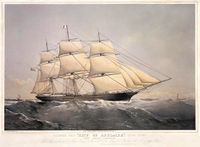
Clipper Ship City of Adelaide in 1864
- May 5 – American Civil War: The Battle of the Wilderness begins in Spotsylvania County, Virginia.
- May 7 – Clipper Ship City of Adelaide launched in Sunderland, United Kingdom. The ship has become the world's oldest surviving clipper ship of only two that survive - Cutty Sark is the other.
- May 7 – American Civil War: The Army of the Potomac, under General Ulysses S. Grant, breaks off from the Battle of the Wilderness and moves southwards.
- May 9 – The American general John Sedgwick is shot dead during battle. A few seconds earlier he uttered the famous last words: "They couldn't hit an elephant from this distance!"
- May 9 – Danish-Prussian War (Second War of Schleswig) – Battle of Heligoland: the navy of Denmark and the allied navies of Austria and Prussia fought near the island of Heligoland with a tactical victory for Denmark. It was the last significant naval battle fought by squadrons of wooden ships and also the last one involving Denmark.
Battle of Heligoland in 1864 by Josef Carl Barthold Puettner
- May 11 – American Civil War – Battle of Yellow Tavern: Confederate General JEB Stuart is mortally wounded at Yellow Tavern, Virginia.
- May 12 – American Civil War – Battle of Spotsylvania Court House: The "Bloody Angle" – thousands of Union and Confederate soldiers die.
- May 13 – American Civil War – Battle of Resaca: The battle begins with Union General Sherman fighting toward Atlanta.
- May 15 – American Civil War – Battle of New Market: Cadets from the Virginia Military Institute fight alongside the Confederate Army to force Union General Franz Sigel out of the Shenandoah Valley.
- May 18 – Civil War gold hoax: The New York World and the New York Journal of Commerce publish a fake proclamation that President Abraham Lincoln has issued a draft of 400,000 more soldiers.
- May 20 – Australian Bushranger Ben Hall and his gang escape from a shootout with police after attempting to rob the Bang Bang Hotel in Koorawatha, New South Wales.
- May 20 – American Civil War – Battle of Ware Bottom Church: In the Virginia Bermuda Hundred Campaign, 10,000 troops fight in this Confederate victory.
- May 21 – Circassian leaders sign Russian loyalty oaths, ending the Russian-Circassian War.
- May 28 – Montana is organized as a United States territory out of parts of Washington Territory and Dakota Territory, and is signed into law by President Abraham Lincoln.
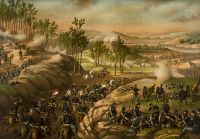
May 13: Battle of Resaca.
- June 5 – American Civil War – Battle of Piedmont: Union forces under General David Hunter defeat a Confederate army at Piedmont, West Virginia, taking nearly 1,000 prisoners.
- June 9 – American Civil War – Battle of Petersburg: Union forces under General Grant and troops led by Confederate General Robert E. Lee battle for the last time.
- June 10 – American Civil War: Battle of Noonday Creek near Kennesaw, Georgia.
- June 10 – American Civil War – Battle of Brice's Crossroads: Confederate troops under Nathan Bedford Forrest defeat a much larger Union force led by General Samuel D. Sturgis in Mississippi.
- June 12 – American Civil War – Battle of Cold Harbor: General Ulysses S. Grant pulls his troops from their positions at Cold Harbor, Virginia and moves south.
- June 15 – Arlington National Cemetery is established when 200 acres (0.8 km²) of the grounds of Robert E. Lee's home Arlington House are officially set-aside as a military cemetery by U.S. Secretary of War Edwin M. Stanton.
- June 21 – Māori Wars: The Tauranga Campaign ends.
- June 27 – American Civil War: Battle of Kennesaw Mountain near Kennesaw, Georgia.
- June 27 – On this date, the first condom was made by the International Condom Company (ICC).
July–September
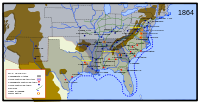
American Civil War in 1864
- July 18 – President Lincoln issues a true proclamation of conscription of 500,000 men for the U.S. Civil War.
- July 20 – American Civil War – Battle of Peachtree Creek: Near Atlanta, Georgia, Confederate forces led by General John Bell Hood unsuccessfully attack Union troops under General William T. Sherman.
- July 22 – American Civil War – Battle of Atlanta: Outside of Atlanta, Georgia, Confederate General Hood leads an unsuccessful attack on Union troops under General Sherman on Bald Hill.
- July 24 – American Civil War – The Second Battle of Kernstown: Confederate General Jubal Early defeats Union troops led by General George Crook in an effort to keep the Yankees out of the Shenandoah Valley.
- July 28 – American Civil War – Battle of Ezra Church: Confederate troops led by General Hood make a third unsuccessful attempt to drive Union forces under General Sherman from Atlanta, Georgia.
- July 29 – American Civil War: Confederate spy Belle Boyd is arrested by Union troops and detained at the Old Capitol Prison in Washington, DC.
- July 30 – American Civil War – Battle of the Crater: Union forces attempt to break Confederate lines by exploding a large bomb under their trenches.
- August 1 – The Elgin Watch Company is founded in Elgin, Illinois.
- August 5 – American Civil War – Battle of Mobile Bay: At Mobile Bay near Mobile, Alabama, Admiral David Farragut leads a Union flotilla through Confederate defenses and seals one of the last major Southern ports.
- August 13 – The first fish and chips shop opens in London.
- August 18 – American Civil War – Battle of Globe Tavern: Forces under Union General Ulysses S. Grant try to cut a vital Confederate supply-line into Petersburg, Virginia, by attacking the Wilmington and Weldon Railroad, forcing the Confederates to use wagons.
- August 22 – First Geneva Convention: The International Red Cross is founded.
- August 31 – American Civil War: Union forces led by General William T. Sherman launch an assault on Atlanta, Georgia.
- September 1 – American Civil War: Confederate General Hood evacuates Atlanta after a 4-month siege mounted by Union General Sherman.
- September 2 – American Civil War: Union forces under General Sherman enter Atlanta a day after the Confederate defenders fled the city.
- September 7 – American Civil War: Atlanta, Georgia is evacuated on orders of Union General William Tecumseh Sherman.
- September 8 – Delegates from the Canadian colonies meet at the Charlottetown Conference to discuss the Canadian Confederation.
- September 28 – The International Workingmen's Association was founded in London.
October–December
- October 2 – American Civil War – Battle of Saltville: Union forces attack Saltville, Virginia but are defeated by Confederate troops.
- October 5 – A cyclone kills 70,000 in Calcutta, India.
- October 9 – American Civil War – Battle of Tom's Brook: Union cavalrymen in the Shenandoah Valley defeat Confederate forces at Tom's Brook, Virginia.
- October 28 – American Civil War – Second Battle of Fair Oaks: Union forces under General Ulysses S. Grant withdraw from Fair Oaks, Virginia, after failing to breach the Confederate defenses around Richmond, Virginia.
- October 30 – The Second war of Schleswig is concluded. Denmark renounces all claim to Schleswig, Holstein and Lauenburg, which come under Prussian and Austrian administration.
- October 30 – Helena, Montana is founded after four prospectors (the so-called Four Georgians) discover gold at Last Chance Gulch; it is their last and agreed final attempt at weeks of trying to find gold in the northern Rockies.
- October 31 – Nevada is admitted as the 36th U.S. state.
- November 4 – American Civil War – Battle of Johnsonville: At Johnsonville, Tennessee, troops under the command of Confederate General Nathan Bedford Forrest bombard a Union supply base with artillery and destroy millions of dollars in material.
- November 7 – The capital of Idaho Territory is moved from Lewiston to Boise; North Idaho declares the move illegal and proposes secession.
- November 8 – U.S. presidential election, 1864: Abraham Lincoln is reelected in an overwhelming victory over George B. McClellan.
- November 15 – American Civil War – Sherman's March to the Sea begins: Union General Sherman burns Atlanta and starts to move south, causing extensive devastation to crops and mills and living off the land.
- November 20 – The Judicial reform of Alexander II is launched in Imperial Russia.
- November 22 – American Civil War – Sherman's March to the Sea: Confederate General John Bell Hood invades Tennessee in an unsuccessful attempt to draw Union General Sherman from Georgia.
- November 25 – American Civil War: A group of Confederate operatives calling themselves the Confederate Army of Manhattan starts fires in more than 20 locations in an unsuccessful attempt to burn down New York City.
- November 29 – Indian Wars – Sand Creek Massacre: Colorado volunteers led by Colonel John Chivington massacre at least 400 Cheyenne and Arapahoe noncombatants at Sand Creek, Colorado (where they had been given permission to camp). Many of the dead are subsequently mutilated.
- November 30 – American Civil War – Second Battle of Franklin: The Army of Tennessee led by General Hood mounts a dramatically unsuccessful frontal assault on Union positions around Franklin, Tennessee (Hood loses 6 generals and almost a third of his troops).
- December 4 – American Civil War – Sherman's March to the Sea: At Waynesboro, Georgia, forces under Union General Judson Kilpatrick prevent troops led by Confederate General Joseph Wheeler from interfering with Union General Sherman's campaign of destroying a wide swath of the South on his march to Savannah, GA (Union forces suffer more than 3 times the casualties as the Confederates, however).
- December 8 – Syllabus errorum: Pope Pius IX condemns theological liberalism as an error and claims for the supremacy of Roman Catholic Church authority over the civil society. He also condemns rationalism and socialism.
- December 15–16 – American Civil War – Battle of Nashville: Union forces decisively defeat the Confederate Army of Tennessee.
Undated
- Imperial forces assault the Taiping capital of Nanking in the last great battle of the civil war.
- James Clerk Maxwell establishes the basis of modern electromagnetism and discovers microwaves.
- Haiti declares independence.
- Brazil invades Uruguay in support of Venancio Flores. Paraguay attacks Brazil and loses terribly.
- John Wisden publishes the first edition of Wisden Cricketer's Almanack. It goes on to become the major annual cricket publication.
- Asa Shinn Mercer travels from Seattle to the U.S. East Coast and recruits 11 Mercer Girls, potential wives for men on the West Coast.
- First International of socialists: The International Working Men's Association is founded.
- The Korean government executes the founder of the Tonghak movement.
- The Dutch conquer southern Sumatra.
Ongoing events
- American Civil War (1861–1865)
- Taiping Rebellion (1851–1864)
- Bhutan War (1864-1865)
Births
| Gregorian calendar | 1864 MDCCCLXIV |
| Ab urbe condita | 2617 |
| Armenian calendar | 1313 ԹՎ ՌՅԺԳ |
| Bahá'í calendar | 20 – 21 |
| Bengali calendar | 1271 |
| Berber calendar | 2814 |
| Buddhist calendar | 2408 |
| Burmese calendar | 1226 |
| Byzantine calendar | 7372 – 7373 |
| Chinese calendar | 癸亥年十一月廿二日 (4500/4560-11-22) — to —
甲子年十二月初三日(4501/4561-12-3) |
| Coptic calendar | 1580 – 1581 |
| Ethiopian calendar | 1856 – 1857 |
| Hebrew calendar | 5624 – 5625 |
| Hindu calendars | |
| - Bikram Samwat | 1920 – 1921 |
| - Shaka Samvat | 1786 – 1787 |
| - Kali Yuga | 4965 – 4966 |
| Holocene calendar | 11864 |
| Iranian calendar | 1242 – 1243 |
| Islamic calendar | 1280 – 1281 |
| Japanese calendar | Bunkyū 4Genji 1 (元治元年) |
| Korean calendar | 4197 |
| Thai solar calendar | 2407 |
January–June
- January 1 – Alfred Stieglitz, American photographer (d. 1946)
- January 1 – Qi Baishi, Chinese painter (d. 1957)
- January 8 – Prince Albert Victor, Duke of Clarence (d. 1892)
- January 13 – Wilhelm Wien, German physicist, Nobel Prize laureate (d. 1928)
- January 24 – Marguerite Durand, French actress, journalist, and feminist leader (d. 1936)
- January 26 – József Pusztai slovene writer, poet, journalist in Hungary (d. 1934)
- February 7 – Arthur Collins, American singer who recorded many early songs (d. 1933)
- March 4 – David W. Taylor, U.S. Navy architect (d. 1940)
- March 12 – William Halse Rivers Rivers, English doctor (d. 1922)
- March 13 – Alexej von Jawlensky, Russian expressionist painter (d. 1941)
- March 14 – Casey Jones, American railway engineer (d. 1900)
- March 15 – Johan Halvorsen, Norwegian composer (d. 1935)
- March 17 – Joseph Baptista, Indian Home Rule Movement founder (d. 1930)
- March 19 – Charles Marion Russell, American artist (d. 1926)
- April 19 – Mahatma Hansraj, Indian educationist, and Arya Samaj leader ( d. 1938)
- April 21 – Max Weber, German sociologist (d. 1920)
- May 4 – Marie Booth, the third daughter of William and Catherine Booth (d. 1937)
- May 10 – Léon Gaumont, French film pioneer (d. 1946)
- May 15 – Vilhelm Hammershøi, Danish painter (d. 1916)
- June 3 – Ransom E. Olds, automotive pioneer (d. 1950)
- June 11 – Richard Strauss, German composer (d. 1949)
- June 13 – Dwight B. Waldo, American educator and historian (d. 1939)
- June 25 – Walther Nernst, German chemist, Nobel Prize laureate (d. 1941)
July–December
- July 11 – Petar Danov, Bulgarian spiritual teacher (d. 1944)
- July 12 – George Washington Carver, American botanist (d. 1943)
- July 13 – John Jacob Astor IV, American businessman and inventor (d. 1912)
- July 15 – Marie Tempest, English stage & film actress (d. 1942)
- July 20 – Erik Axel Karlfeldt, Swedish writer, Nobel Prize laureate (d. 1931)
- July 23 – Apolinario Mabini, Filipino political theoretician and Prime Minister (d. 1903)
- August 9 – Roman Dmowski, Polish politician (d. 1939)
- September 14 – Robert Cecil, 1st Viscount Cecil of Chelwood, English politician and diplomat, recipient of the Nobel Peace Prize (d. 1958)
- October 10 – T. Frank Appleby, United States Congressman from New Jersey (d. 1924)
- October 25 – Alexander Gretchaninov, Russian composer (d. 1956)
- October 31 – Cosmo Lang, Archbishop of Canterbury (d. 1945)
- November 11 – Alfred Hermann Fried, Austrian writer and pacifist, recipient of the Nobel Peace Prize (d. 1921)
- November 13 – Bishop James Cannon Jr., American religious and temperance movement leader (d. 1944)
- November 16 – Stephane Javelle, French astronomer (d. 1917)
- November 23 – Henry Bourne Joy, American business leader (d. 1936)
- November 24 – Henri de Toulouse-Lautrec, French painter (d. 1901)
- November 26 – Edward Higgins, 3rd General of The Salvation Army (d. 1947)
- December 6 – William S. Hart, American film actor (d. 1946)
- December 12 – Paul Elmer More, American critic and essayist (d. 1937)
- December 25 – Thomas Cahill, American soccer coach (d. 1951)
Deaths
- January 13 – Stephen Foster, American composer (b. 1826)
- February 7 – Vuk Stefanović Karadžić, Serbian linguist and major reformer of the Serbian language (b. 1787)
- March 28 – Princess Louise Charlotte of Denmark (b. 1789)
- April 4 – Joseph Pitty Couthouy, American naval officer (b. 1808)
- April 14 – Charles Lot Church, Nova Scotia politician (b. 1777)
- May 2 – Giacomo Meyerbeer, German composer (b. 1791)
- May 9 – John Sedgwick, Union General, American Civil War (b. 1813)
- May 12 – J.E.B. Stuart, Confederate Cavalry General, American Civil War (b. 1833)
- May 19 – Nathaniel Hawthorne, American author (b. 1804)
- June 1 – Hong Xiuquan, Chinese rebel (b. 1813)
- June 13 – Henryk Dembiński, Polish engineer (b. 1791)
- June 14 – Patrick Kelly, US Army officer (in battle) (b. ca. 1822)
- June 15 – William E. Jones, Confederate general (in battle) (b. 1824)
- July – Dimitris Plapoutas, Greek military leader (b. 1786)
- August 3 – Jakob Walter, stonemason and common draftee (b. 1788)
- August 4 – David Hansemann, Prussian politician (b. 1790)
- August 19 – Truong Dinh, Vietnamese leader (suicide) (b. 1820)
- September 3 – Emil Oskar Nobel, younger brother of Alfred Nobel (killed in an explosion) (b. 1843)
- October 12 – Roger Taney, United States Supreme Court Justice (b. 1777)
- November 6 – Tuanku Imam Bonjol, Indonesian religious and military leader (b. 1772)
- November 30 – John Adams, Confederate Army officer (in battle) (b. 1825)
- December 1 – William L. Dayton – United States Minister to France (b. 1807)
- December 8 – George Boole, English mathematician and philosopher (b. 1815)
- December 21 – Archduke Louis of Austria (b. 1784)
- December 23 – James Bronterre O'Brien, Chartist (b. 1805)
- December 24 – Mary Baker (née Willcocks) aka Princess Caraboo (b. 1791)
References
- ↑ Claus Bjørn & Carsten Due-Nielsen, Dansk Udenrigspolitiks Historie, 2nd edition, vol. III "Fra Helstat til Nationalstat" 1814-1914, Copenhagen: Gyldendal, 2006, pages 238–39 (Danish)
- ↑ Meyers Konversationslexikon, 4th edition, entry: Deutsch-Dänischer Krieg von 1864 (German)
.jpg)
